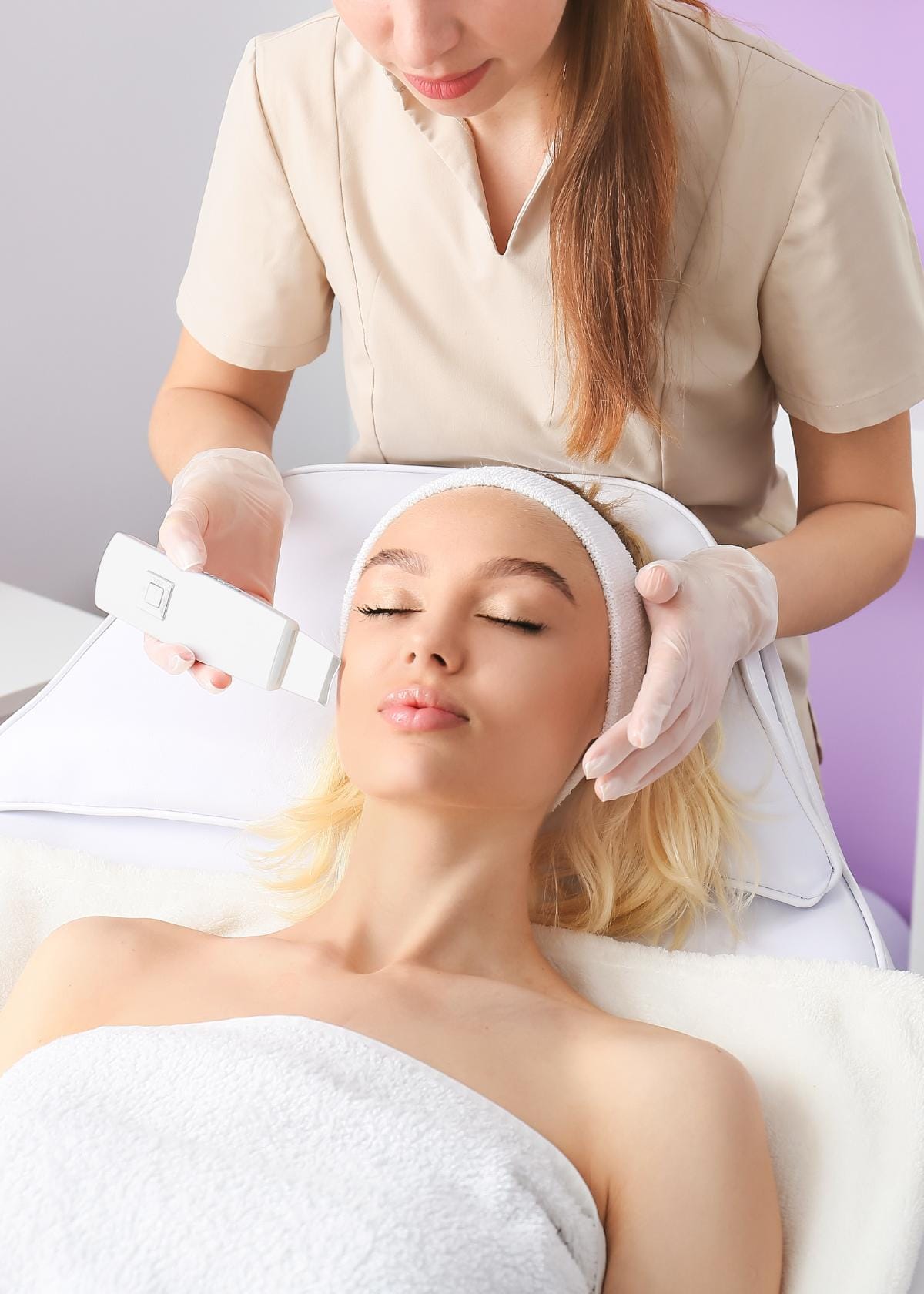Are you looking for effective and speedy solutions to address hyperpigmentation? You’re not alone: countless individuals battle with skin discoloration caused by factors like sun exposure or hormonal changes.
In this article, we will guide you through various treatments, from dermatologist-approved methods to simple home remedies that can help clear hyperpigmentation fast. Keep scrolling; your journey towards even-toned skin starts here.
Causes and Factors of Hyperpigmentation

Inflammation, sun exposure, melasma, and medical conditions or medication can contribute to the development of hyperpigmentation. Let's take a closer look at each of these causes and factors.
Inflammation
Inflammation can trigger hyperpigmentation, especially in the case of acne or injuries to the skin. This process is known as post-inflammatory hyperpigmentation (PIH). It results from an overproduction of melanin after the skin tries to heal itself from any inflammation or injury.
PIH often shows up as dark spots or patches on the area where the inflammation occurred and can affect all skin types. But don't worry. Several treatment options, such as face acids and lightening creams, can help fade this type of hyperpigmentation effectively.
Sun Exposure
Excessive sun exposure is a major factor contributing to hyperpigmentation. When our skin is exposed to the sun's harmful UV rays, it triggers an increase in melanin production, leading to dark spots and uneven skin tone.
Sunspots, also known as solar lentigines or age spots, are one of the most common forms of hyperpigmentation caused by sun exposure. It's important to protect your skin from the sun by wearing sunscreen with a high SPF and seeking shade during peak hours.
Remember that even on cloudy days, UV rays can still penetrate through the clouds and cause damage to your skin.
Melasma
Melasma is a type of hyperpigmentation that commonly appears as brown or gray patches on the face. It is often triggered by hormonal changes, such as pregnancy or birth control pills.
Sun exposure can also worsen melasma and may lead to darker skin tones. While melasma can be challenging to treat, there are options available. Dermatologists may recommend treatments like chemical peels, laser therapy, and skin-lightening creams containing ingredients like kojic acid or licorice root extract.
However, it's important to note that results may vary depending on individual factors and consistency in treatment and prevention methods.
Medical Conditions or Medication
Certain medical conditions or medications can contribute to the development of hyperpigmentation. For example, hormonal imbalances caused by conditions like polycystic ovary syndrome (PCOS) or thyroid disorders can trigger increased melanin production and result in dark skin tones.
Other medical conditions that may cause hyperpigmentation include Addison's disease and certain autoimmune disorders. In addition, some medications, such as nonsteroidal anti-inflammatory drugs (NSAIDs), antibiotics, and chemotherapy drugs, have been linked to pigmentation changes in the skin.
If you suspect that your medication or a medical condition is contributing to your hyperpigmentation, it's important to consult with a healthcare professional for appropriate management options.
Dermatologist-Approved Treatment Options for Hyperpigmentation

Dermatologists recommend a variety of treatment options for hyperpigmentation, including face acids, retinoids, chemical peels, laser peels, intense pulse light therapy (IPL), and microdermabrasion.
Learn more about these effective treatments by reading the full details.
Face Acids
Face acids are a popular treatment option for hyperpigmentation. These acids work by exfoliating the top layers of skin, which helps to lighten dark spots and even out skin tone. One commonly used face acid is glycolic acid, which is derived from sugar cane.
It gently removes dead skin cells and stimulates collagen production, resulting in brighter and more radiant skin. Another effective face acid is salicylic acid, known for its ability to penetrate deep into pores and unclog them.
This can help treat acne-related hyperpigmentation by reducing inflammation and promoting cell turnover. Other examples of face acids include lactic acid, mandelic acid, and azelaic acid, each with its own specific benefits for treating hyperpigmentation.
Applying face acids as part of your skincare routine can help accelerate the fading of dark spots caused by hyperpigmentation. However, it's important to start slowly with low concentrations to avoid irritation or sensitivity reactions.
Gradually increase the frequency and strength over time as your skin adjusts. Regular use of face acids combined with sun protection measures can lead to visible improvements in pigmentation issues over time. Face acids are the best way to treat hyperpigmentation.
Retinoids
Retinoids are a popular and dermatologist-approved treatment option for hyperpigmentation. These powerful compounds, derived from vitamin A, work by increasing cell turnover and promoting the growth of new skin cells.
By accelerating the shedding of darkened skin cells, retinoids can help fade hyperpigmentation and improve overall skin tone. Regular use of retinoids can also reduce acne breakouts and clogged pores, leading to clearer and smoother skin.
It is important to note that retinoids may cause some initial redness or peeling as your skin adjusts to the treatment, so it's best to start with a low concentration and gradually increase usage over time. With retinoid creams and products, you can get rid of hyperpigmentation faster, even if you have sensitive skin pigmentation.
Chemical Peels
Chemical peels are a popular treatment option for hyperpigmentation. They involve applying a chemical solution to the skin, which causes the top layer of dead skin cells to peel off.
This reveals fresh, new skin underneath and can help reduce the appearance of dark spots and uneven pigmentation. Chemical peels work by exfoliating the skin and stimulating collagen production, promoting a more even complexion.
They can be performed at different depths, depending on the severity of hyperpigmentation. It's important to note that chemical peels should only be done by a qualified professional to ensure safety and effectiveness.
Laser Peels
Laser peels are a professional treatment option for hyperpigmentation that can help fade dark spots and even out the skin tone. During a laser peel, concentrated beams of light target the pigmented areas on the skin, breaking up excess melanin and stimulating collagen production.
This process encourages new, healthier skin cells to replace the damaged ones, resulting in a brighter and more even complexion. Laser peels are effective for treating various types of hyperpigmentation, including sunspots, acne scars, and melasma.
It is important to note that multiple sessions may be needed to achieve desired results, and downtime after the procedure can vary depending on the intensity of the treatment. Overall, laser peels offer a safe and non-invasive solution for those looking to clear hyperpigmentation fast with long-lasting effects.
Intense Pulse Light Therapy (IPL)
Intense pulse light therapy (IPL) is a dermatologist-approved treatment option for hyperpigmentation. It involves using high-intensity pulses of light to target and break down the pigment in dark spots on the skin.
IPL works by specifically targeting melanin, the pigment responsible for skin coloration, and heating it up to stimulate the body's natural healing process. Over time, this can help reduce the appearance of hyperpigmentation and even out the skin tone.
IPL treatments are typically done in a series, with each session lasting around 20-30 minutes. It's important to note that IPL may cause some mild discomfort during treatment but is generally well-tolerated by most individuals.
Microdermabrasion
Microdermabrasion is a professional treatment option for hyperpigmentation that uses a handheld device to exfoliate the top layer of skin. During the procedure, tiny crystals are sprayed onto the skin surface, which helps remove dead skin cells and promote cell turnover.
This process can help reduce the appearance of dark spots and improve overall skin tone. Microdermabrasion is suitable for all skin types and typically requires multiple sessions to see significant results.
It is a non-invasive treatment option that does not require any downtime, making it a popular choice for those looking to fade hyperpigmentation quickly.
Over-the-Counter and Home Remedies for Hyperpigmentation

Over-the-counter skin-lightening creams, as well as natural remedies such as vitamin C, niacinamide, and aloe vera, can be effective in reducing hyperpigmentation.
Skin lightening creams
Skin-lightening creams can be an effective option for reducing the appearance of hyperpigmentation. These creams typically contain ingredients that help to inhibit melanin production in the skin, leading to a lighter and more even complexion. Some common ingredients found in these creams include:
- Hydroquinone: This is one of the most commonly used ingredients in skin-lightening creams. It works by inhibiting the enzyme responsible for producing melanin.
- Kojic acid: Derived from a fungus, kojic acid also helps to suppress melanin production and can be effective in treating hyperpigmentation.
- Vitamin C: As a powerful antioxidant, vitamin C not only helps to lighten dark spots but also boosts collagen production and promotes overall skin health.
- Licorice root extract: This natural ingredient contains compounds that have been shown to possess skin-brightening properties.
- Niacinamide: Also known as vitamin B3, niacinamide can help to reduce the production of excess melanin and improve the overall texture of the skin.
Vitamin C
Vitamin C is a popular ingredient in skincare products for its ability to brighten oily skin and fade hyperpigmentation. It works by inhibiting melanin production, which can help lighten dark spots and even out skin tone.
Additionally, vitamin C has antioxidant properties that can protect the skin from free radical damage caused by sun exposure and environmental stressors. This powerful antioxidant also helps to promote collagen production, improving the overall texture of the skin.
Including foods rich in vitamin C, such as citrus fruits, berries, and leafy greens, in your diet can provide additional benefits for managing hyperpigmentation.
Niacinamide
Niacinamide is a popular ingredient for treating hyperpigmentation. It is a form of vitamin B3 that has been shown to help lighten dark spots and even out skin tone. Niacinamide works by inhibiting the transfer of melanin, the pigment responsible for dark spots, from deeper layers of the skin to the surface.
This helps to reduce the appearance of hyperpigmentation over time. Additionally, niacinamide has anti-inflammatory properties that can help calm irritated skin and prevent further pigmentation issues.
Regular use of skin care products containing niacinamide can help fade hyperpigmentation and improve overall skin clarity.
Azelaic Acid
Azelaic acid is a dermatologist-approved treatment option for hyperpigmentation. It works by inhibiting the production of melanin, which helps to lighten dark spots and even out skin tone.
Research has shown that azelaic acid can be effective in fading hyperpigmentation and reducing the appearance of acne scars. It also has anti-inflammatory properties that can help to calm redness and irritation on the skin.
Azelaic acid is available both as a prescription medication and as an over-the-counter product in lower concentrations. Regular use of azelaic acid, along with a consistent skincare routine, can help to achieve noticeable results in improving hyperpigmentation.
Natural Remedies (Aloe Vera, Green Tea, Coconut Oil)
Natural remedies can be effective in treating hyperpigmentation. Some options to consider include:
- Aloe vera: Aloe vera contains a compound called aloesin, which may help lighten hyperpigmentation by inhibiting melanin production in the skin.
- Green tea: Green tea is rich in antioxidants that can help reduce inflammation and protect the skin from damage caused by free radicals.
- Turmeric: Turmeric contains curcumin, a powerful antioxidant with anti-inflammatory properties that may help fade pigmentation and even out skin tone.
- Licorice root: Licorice root extract has been found to inhibit tyrosinase activity, which can help reduce melanin production and lighten dark spots.
- Apple cider vinegar: Apple cider vinegar has natural exfoliating properties that can help slough off dead skin cells and reveal brighter, more even-toned skin.
- Lemon juice: The acid in lemon juice acts as a natural bleaching agent and may help fade hyperpigmentation over time. However, it's important to use caution when using lemon juice on the skin as it can cause irritation or photosensitivity.
Prevention and Maintenance for Hyperpigmentation

To prevent and maintain hyperpigmentation, it is essential to establish a daily skincare routine that includes gentle cleansing, regular exfoliation, and the use of products containing ingredients like vitamin C and niacinamide.
Additionally, diligent sun protection through the consistent application of sunscreen with an SPF of 30 or higher is crucial in preventing further darkening of pigmented areas.
Proper nutrition, including a diet rich in antioxidants and vitamins, can also support overall skin health and reduce the risk of hyperpigmentation.
Daily Skincare Routine
Taking care of your skin on a daily basis can help in managing and lightening hyperpigmentation. Follow these steps to maintain a healthy and even skin tone:
- Cleanse your face twice a day using a gentle cleanser to remove dirt, oil, and makeup.
- Apply a toner after cleansing to balance the pH levels of your skin and prepare it for treatment products.
- Use a targeted serum or treatment containing ingredients like vitamin C, niacinamide, or kojic acid to lighten dark spots and even out the skin tone.
- Moisturize your skin with a non-comedogenic moisturizer to keep it hydrated and prevent dryness that can worsen hyperpigmentation.
- Apply sunscreen with at least SPF 30 every morning, as UV rays can darken existing pigmentation and cause new spots to form.
- At night, use a retinoid cream or serum to promote cell turnover and fade hyperpigmentation over time.
- Exfoliate your skin once or twice a week using a chemical exfoliant containing alpha hydroxy acids (AHAs) or beta hydroxy acids (BHAs) to remove dead skin cells and reveal brighter, more even-toned skin.
Sun Protection
Protecting your skin from the sun is crucial in preventing and reducing hyperpigmentation. Sun exposure can worsen existing dark spots and trigger the production of more melanin, leading to further discoloration.
To shield your skin from harmful UV rays, make sure to wear a broad-spectrum sunscreen with at least SPF 30 every day, even on cloudy days. Reapply it every two hours, especially if you're spending time outdoors.
Additionally, seek shade during peak sunlight hours (10 am to 4 pm) and cover up with protective clothing like hats and sunglasses. By prioritizing sun protection, you can help fade hyperpigmentation and maintain a more even complexion over time.
Nutritional Factors
Maintaining a balanced diet is crucial when it comes to managing hyperpigmentation. Certain nutrients can help promote healthy skin and reduce discoloration. Antioxidant-rich foods like fruits, vegetables, and green tea can aid in reducing inflammation and preventing further damage.
Additionally, incorporating foods high in vitamins C and E, such as citrus fruits and almonds, can support collagen production and improve overall skin health. It's important to note that while nutrition plays a role in treating hyperpigmentation, it should be combined with other treatments for optimal results.
Frequently Asked Questions
In these FAQs, we'll discuss the most effective ways to rapidly reduce the appearance of dark spots and achieve a more even skin tone.
We'll cover topics like exfoliation, brightening ingredients to look for in skin care products, professional treatments that can fast-track results, and daily habits that can help prevent future hyperpigmentation.
What are some natural remedies for skin discoloration due to hyperpigmentation?
Natural treatments such as aloe vera and turmeric have proven effective in lightening uneven skin tone caused by hyperpigmentation.
Does Vitamin C clear hyperpigmentation fast?
Yes, Vitamin C is an essential component of many hyperpigmentation creams and can lighten dark spots effectively when used regularly.
Can I use home remedies for uneven skin tone due to hyperpigmentation?
Absolutely! Home remedies like apple cider vinegar or Licorice root can prove helpful in managing and reducing the appearance of hyperpigmentation on your face naturally.
Are there professional treatments available for clearing hyperpigmentation quickly?
Yes, numerous professional services such as laser peels, chemical peels, and intense pulse light therapy offer faster solutions to treat dark spots caused by pigmented lesions or inflammation on the skin's surface.
Will using face acids help fade pigmented spots on my face?
Face acids like Kojic acid or Retinoids incorporated into your skincare routine act significantly towards reducing discoloration resulting from excess melanin production in certain areas of the skin.
Besides treating, how can I prevent future occurrences of Hyper-pigmented spots on my face?
To prevent further occurrences, keep your skin protected from excessive sunlight that triggers pigment over-production; also, maintain a healthy lifestyle with good nutrition, which supports overall well-being, including healthy cell generation under our epidermis layers.
Conclusion
Discovering effective treatments for hyperpigmentation is essential if you're seeking to clear dark spots quickly.
From dermatologist-approved options like face acids, retinoids, and chemical peels to over-the-counter remedies such as skin-lightening creams and vitamin C, there are a range of solutions available.
By incorporating these treatments into your skincare routine and taking preventative measures like sun protection, you can start fading hyperpigmentation faster and achieve a more even complexion.



